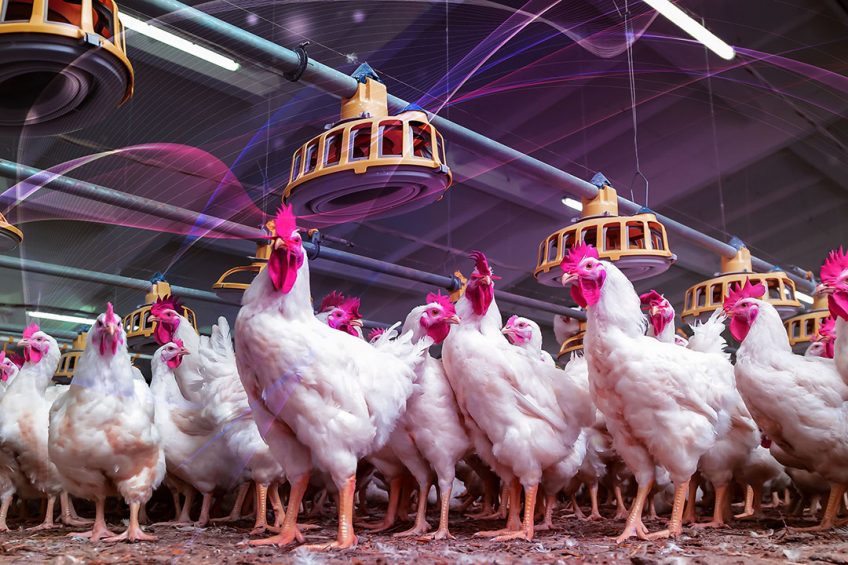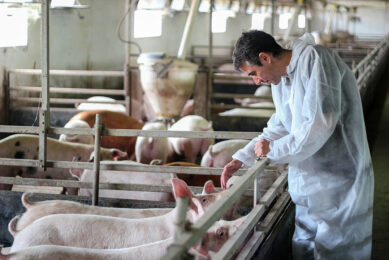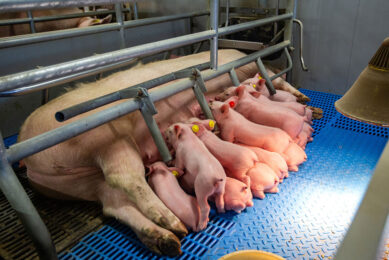Efficiently raising antibiotic-free broilers

Broiler growers worldwide are under pressure to reduce or eliminate growth-promoting antibiotics from bird diets. Promoting intestinal health through improved nutrition and immune system stimulation can help producers successfully replace or reduce antimicrobials without sacrificing bird health or performance.
Completely removing or significantly reducing the use of antibiotic growth promoters (AGPs) raises many issues for broiler producers. Their foremost concerns are whether their grow-out operations can remain competitive, profitable and free from performance-robbing intestinal diseases like necrotic enteritis.
Broiler growers moving to antibiotic-free poultry production now have the advantage of hindsight, unlike those who were impacted by the first antibiotic bans of 20-plus years ago. Since then, many compounds have been studied for their ability to replace AGPs. Prebiotics, probiotics, enzymes, organic acids, minerals and other additives can be used successfully to manage gut health instead of AGPs. But, and this is a big caveat, these products are often used in combination and increase feed costs. Formulated feed additives that combine the right ingredients to replace one or more other additives and help birds grow efficiently may be just what today’s broiler producers need. Certain formulated feed additives are designed to use different and (ideally) synergistic modes of action to achieve desired responses. Such products are typically tested by a team of specialists to determine the optimal formulation so growers don’t have to experiment. Those factors help formulated products deliver value.
Intestinal health is critical
A healthy gut is essential to a healthy bird. However, the gastrointestinal (GI) tract is the site of substantial disease challenges, including pathogens like Clostridium perfringens, Escherichia coli and Salmonella spp. An effective antibiotic alternative should demonstrate activity in three areas:
- The intestinal lumen to reduce bacterial disease challenges,
- The intestinal epithelium to strengthen the intestinal barrier,
- The gut-associated lymphoid tissue (GALT) to stimulate immune function.
Varium is used worldwide in antibiotic-free poultry production to achieve equivalent outcomes as AGPs, often replacing one or more additional feed additives being used as replacements to AGPs. Multiple controlled studies and field trials demonstrate that Varium, a proprietary formulated feed additive, can replace some or all AGPs use in broiler diets. The components of the all-natural product work synergistically to provide a multifaceted approach to supporting intestinal health and immunity, promoting efficient feed use and improving overall flock performance, see Figure 1. Those mechanisms of action support bird intestinal health and efficiency by:
- Reducing total biotoxin load, which helps protect intestinal homeostasis,
- Reducing pathogen load through type-1 fimbriae bacterial adhesion,
- Providing enterocytes with a preferred energy source, which enhances the intestinal barrier,
- Stimulating the innate and adaptive immune responses to help birds defend against pathogens.
Figure 1 – Multimodal support of intestinal health.

Trials find comparable performance
For broiler producers seeking evidence-based options, pre- adoption trial data from commercial broiler producers in Brazil demonstrate how Varium performs alone or in combination with other feed additives. In a 40-day feeding trial conducted under natural challenge, 2,400 day-old chicks were assigned to one of four treatments (Table 1).
In addition to the specified treatments, all diets included common anticoccidial treatments. Captured and calculated data included body weight, feed intake, mortality, feed conversion ratio (FCR) and percent mortality. Broilers fed diets containing Varium alone or in combination with other additives had weight gain and FCR comparable to those fed a diet containing two antibiotics, a mycotoxin binder and a probiotic. No significant differences in day-40 weight gain or FCR were detected among treatments. However, mortality at day 40 was substantially lower for broilers consuming Varium in their diets. Broilers fed diets containing Varium had higher production efficiency indices (PEI) than the control group. A second trial in Brazil compared the performance of Varium to Tylosin when fed to birds at a commercial broiler grow-out operation that produced about 170,000 birds per day for slaughter. Tylosin at a rate of 55 ppm was added to diets between August 2017 and July 2018. Tylosin and an enzyme-based mycotoxin deactivator were then removed and Varium was added at a rate of 0.1% from August 2018 through July 2019.
Captured and calculated data included body weight and age at slaughter, average daily gain, FCR, PEI, mortality and liver quality. No significant differences were detected between treatments for FCR, average daily gain, average body weight, average age at slaughter, PEI or percent mortality. Interestingly, faeces from broilers fed diets containing the feed additive were firmer, resulting in better quality litter than those birds receiving Tylosin in their diets, see Table 2. Better litter quality means decreased incidence of foot pad dermatitis.
Profitable antibiotic-free production
Intestinal health becomes more important to profitable broiler production as AGPs are removed from bird diets. But it takes the right combination of feed ingredients and additives along with many other factors. Varium is helping commercial producers save money by replacing one or more feed additives in broiler diets while maintaining or improving feed conversion and weight gain and decreasing mortality. Efficient broiler production without AGPs is possible.
Author: Dr Hongyu Xue, Life Sciences Director, Amlan International
 Beheer
Beheer





 WP Admin
WP Admin  Bewerk bericht
Bewerk bericht